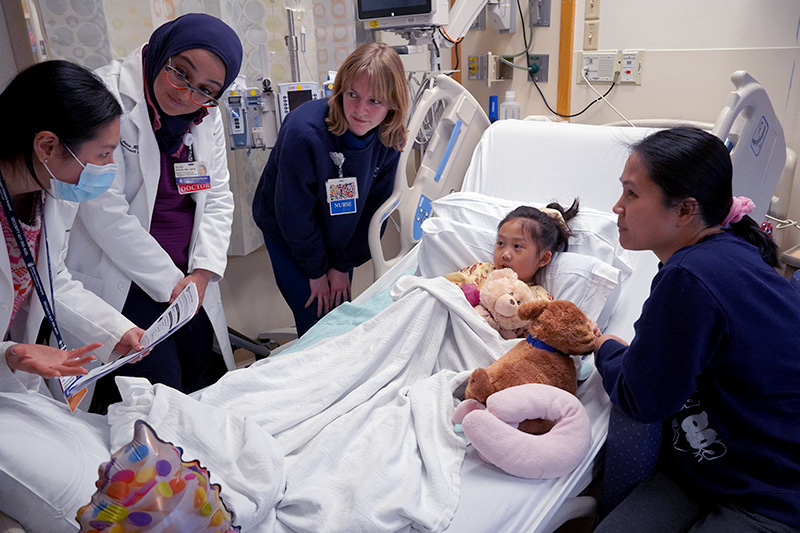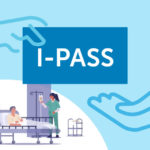Helping clinicians embrace family-centered rounds

If you’ve ever been hospitalized, you may have experienced this: groups of doctors coming in and talking about you like you’re not there or addressing you in a perfunctory manner, using medical jargon you don’t understand.
Peggy Markle was taken aback when her son was hospitalized for a not-yet-defined condition in Washington and his care team came for medical rounds.
“I remember them saying, ‘Your son has something serious; he could die from this,’” she says. “This isn’t something you say in front of an 11-year-old boy. But they did, and very matter-of-factly. I was processing, along with him, very heavy information, and I didn’t have any say or control over how he was told.”
Markle’s hospital was one of a group of centers involved in the national I-PASS patient handoff study, led by Boston Children’s Hospital. I-PASS aims to reduce medical errors by using a structured communications system when handing off a patient’s care to new providers. It has successfully reduced adverse hospital events — by 47 percent in the most recent study, which used faculty “champions” and outside coaches to help hospitals implement the program.
Because her son had been hospitalized on multiple occasions, Markle was invited to become an I-PASS advisor. Today, she’s part of a mentoring team that helps clinicians understand the family perspective.
“I will never forget being at the table with people who were smart and caring and having them listen,” she says.
A new way of rounding
Alisa Khan, MD, MPH, a hospitalist and health services researcher at Boston Children’s, has been adapting I-PASS to actively engage families in clinical rounds. She led a 2018 study that found a nearly 40 percent drop in adverse events after implementing a family-centered rounds intervention.
Getting clinicians to adopt Patient and Family Centered I-PASS rounds isn’t always easy. It requires a willingness to adapt and change old habits. “People raise concerns like, ‘Rounds will take too long,’ or ‘Trainees won’t learn as much,’” says Khan. “And trainees sometimes worry about ‘being wrong’ in front of the family.”
But in actual practice, she finds that family-centered rounding saves time in the long run by getting everyone on the same page about the child’s medical status up front. Trainees have shifted from reciting the pathophysiology of a condition to directly teaching the family about the condition and what to watch for. And it turns out parents don’t mind if a trainee doesn’t have all the answers, so long as they’re truthful and their supervisors provide answers and corrections with grace; this makes parents feel more comfortable asking questions themselves.
As Markle puts it, “Family-centered I-PASS empowered me to not just talk to the nurse on the side, secretly. There’s more trust, more respect.”
Mentoring matters
Markle was part of Khan’s latest study, published in Pediatrics, which used mentors to try to enhance adoption of Patient and Family Centered I-PASS rounds. Led by Khan and co-first author Shilpa Patel, MD, of the University of Hawaii, the study paired trios of mentors (experienced family members, nurses, and physicians) with mentees at the study sites (nurse champions, physician champions, and parent advisors).
I tell clinicians, ‘When we leave the hospital, we’re going to be in charge, so empower us to do a good job.'”
Parent mentor Peggy Markle
In all, the study engaged 21 hospitals and a mentor pool of seven parents, six nurses, and 16 physicians who coached their mentee counterparts and helped them troubleshoot problems. Most of the coaching was virtual due to COVID-19, though the mentors made site visits once during the study to observe rounds in person.
“Usually hospital quality improvement projects are siloed, involving just doctors or just nurses,” says Khan. “Our approach provided a 360-degree view, including families, doctors, and nurses together as equal partners.”
As a mentor, Markle noted that one aspect of the intervention that clinicians found challenging was the I-PASS step of “Synthesis” — having the family repeat back information received from the care team to ensure they understood.
“Some team members were concerned that families would feel tested,” Markle says. “Helping them with that part of the process and helping families feel comfortable speaking up was an important part of what I did.”
Learning to work with families
After an 18-month mentoring intervention, Khan and her colleagues analyzed survey responses from more than 2,200 patients/families, 1,200 resident physicians, 800 nurses, and 375 attendings. They saw improvements in adherence to family-centered rounding, adherence to the I-PASS elements, family synthesis of information, safety outcomes (as reported by residents) in many hospitals, and clinical staff’s perceived safety climate. There were no improvements in patient and family experience post-implementation, but the COVID-19 pandemic may have been a mitigating factor.
“Disparities in experience and medical errors still persist in families with language barriers — that’s the next step of our investigation,” adds Khan. “Also, we need to figure out how to involve families who cannot be at the bedside because they have to work or have transportation or childcare challenges.”
Markle also had opportunities as a mentor to advocate for families, questioning lower hospital staffing levels on weekends, urging nurses to attend rounds even when they were busy, and urging clinicians not to let preconceived notions prevent them from effectively communicating with families.
“I tell clinicians, ‘When we leave the hospital, we’re going to be in charge, so empower us to do a good job,’” Markle says. “I challenge them: ‘I’m grateful for your intelligence and experience, but your knowledge doesn’t help if it can’t be shared lovingly and respectfully.’”
Learn more about the I-PASS study and Patient Safety and Quality at Boston Children’s Hospital.
Related Posts :
-

I-PASS this patient to you: Improved hospital 'handoffs' cut adverse events by almost half
About 15 years ago, Boston Children’s Hospital pediatricians Christopher Landrigan, MD, MPH, and Amy Starmer, MD, MPH, observed a weak ...
-

Language barriers linked with medical errors in hospitalized children
A new study finds that hospitalized children whose families have limited comfort with English are twice as likely to experience ...
-

Providing culturally responsive care to refugee and immigrant families
Refugee and immigrant parents and children have unique care needs. They have left their former lives behind, often due to ...
-

Standing up to microaggressions: A hospital-wide training
How can a large, teaching hospital address racial bias in the midst of a pandemic? This question came to a ...





